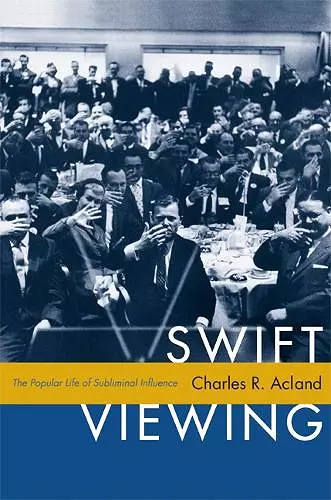Swift Viewing
The Popular Life of Subliminal Influence
Format:Hardback
Publisher:Duke University Press
Published:2nd Jan '12
Currently unavailable, and unfortunately no date known when it will be back

Media theorist Acland looks back at the strange history of subliminal seduction: a theory first propagated in the late 1950s by marketing researcher James Vicary, who claimed that movie audiences bought more refreshments if advertising messages too quick to be noticed were inserted into movies. The study was soon proven false, but that hasn't kept the concept from having a long afterlife in the popular imagination. Acland traces the idea back to late 19th century fears about invisible influences on the masses and up through the work of Marshall McLuhan and Vance Packard. He argues that subliminal influence has persisted as a form of vernacular media criticism because of the way it expresses fears about the pace of media and technological change and the growth of consumer capitalism.
Looks back at the strange history of subliminal seduction: a theory first propagated in the late 1950s by marketing researcher James Vicary, who claimed that movie audiences bought more refreshments if advertising messages too quick to be noticed were inserted into movies.Since the late 1950s, the idea that hidden, imperceptible messages could influence mass behavior has been debated, feared, and ridiculed. In Swift Viewing, Charles R. Acland reveals the secret story of subliminal influence, showing how an obscure concept from experimental psychology became a mainstream belief about our vulnerability to manipulation in an age of media clutter. He chronicles the enduring popularity of the dubious claims about subliminal influence, tracking their migration from nineteenth-century hypnotism to twentieth-century front-page news. His expansive history of popular concern about subliminal messages shows how the notion of “hidden persuaders” became a vernacular media critique, one reflecting anxiety about a rapidly expanding media environment. Through a deep archive of eclectic examples, including educational technology in the American classroom, mind-control tropes in science fiction, Marshall McLuhan’s media theories, and sensational claims in the late 1950s about subliminal advertising, Acland establishes the subliminal as both a product of and a balm for information overload.
“The scale of Swift Viewing is evident in the book’s broad historical sweep which unfolds with the fluidity and accessibility of a popular history, but without sacrificing theoretical and critical rigour. . . . Swift Viewing refuses the theoretician’s claim to a monopoly on ‘the everyday lived nature of cultural life, which cannot be reduced to brute economic explanations nor textualist acrobatics’ (33), insisting instead on a need to respect the critical value of the nuances, dead-ends, insights and assumptions of the people’s own media critique.” - Nicholas Holm, Reviews in Cultural Theory
“Acland . . . offers an exquisitely detailed and subtle accounting of the scientific, cultural and political context for Vicary’s famous announcement and its consequences, focusing most tightly on the 1950s and ’60s." - Julie Sedivy, Literary Review of Canada
“[An] excellent history of the idea of subliminal influence. Those events have been described by several previous writers, but one of the many virtues of Acland’s book is that he gives us the most carefully documented account to date." - Paul Messaris, International Journal of Communication
“Thought-provoking…. [C]ombines a broad historical survey with a compelling analysis of what he calls ‘vernacular cultural critique’ (p. 33), will appeal to scholars interested in the history of psychology, advertising and popular culture…. [A] very original effort to link the history of psychology to the history of popular culture.” - Robert Genter, Cultural Studies
“[Acland’s] style combines a rich historiography with popular and obscure symbols to create an informative and entertaining read.” - Gregory A. Borchard, Popular Culture Review
“[C]aptivating… [B]rings to life the tension of this period by placing readers directly into the cultural context that sparked the debate about subliminal messaging…. I highly recommend Swift Viewing both as a powerfully documented source of our historical past and an enlightening commentary to shape future debates over new forms of subliminal media.” - Kimberly Sugden, Advertising & Society Review
“A comprehensive and compelling archaeology of the dream of invisible influence through media, this is a much-needed and frighteningly contemporary history.”—Fred Turner, author of From Counterculture to Cyberculture: Stewart Brand, the Whole Earth Network, and the Rise of Digital Utopianism
“Making an important intervention in media and cultural history, Charles R. Acland examines how a seemingly ‘fringe’ technological practice became a lightning rod for public anxiety about the power of the media. As he argues, the idea of subliminal influence is still very much with us. It may have been scientifically refuted, but it is clearly of continuing relevance in popular suspicions about the relationship between media, information, and consciousness.”—Jeffrey Sconce, author of Haunted Media: Electronic Presence from Telegraphy to Television
“[An] excellent history of the idea of subliminal influence. Those events have been described by several previous writers, but one of the many virtues of Acland’s book is that he gives us the most carefully documented account to date." -- Paul Messaris * International Journal of Communication *
“Acland . . . offers an exquisitely detailed and subtle accounting of the scientific, cultural and political context for Vicary’s famous announcement and its consequences, focusing most tightly on the 1950s and ’60s." -- Julie Sedivy * Literary Review of Canada *
“The scale of Swift Viewing is evident in the book’s broad historical sweep which unfolds with the fluidity and accessibility of a popular history, but without sacrificing theoretical and critical rigour. . . . Swift Viewing refuses the theoretician’s claim to a monopoly on ‘the everyday lived nature of cultural life, which cannot be reduced to brute economic explanations nor textualist acrobatics’ (33), insisting instead on a need to respect the critical value of the nuances, dead-ends, insights and assumptions of the people’s own media critique.” -- Nicholas Holm * Reviews in Cultural Theory *
ISBN: 9780822349242
Dimensions: unknown
Weight: 458g
328 pages